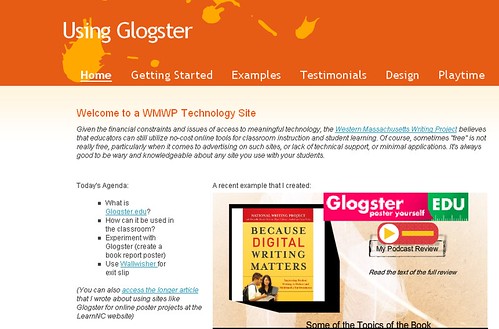Each year, Edublogs (which I use for personal and school blogs) hosts its annual Edublog Awards. I know some folks frown on an awards idea for bloggers and it can often seem like shouting in an echo chamber (we all nominate the popular bloggers, who get more popular, etc.). But I like that it makes me stop for a stretch and reflect on those folks whom I read and learn from on a regular basis.
So, with a few disclaimers down below, here are my nominations. I did not do every single category. I only did nominations in the categories that I felt strongly about:
Best individual blog: Bud the Teacher http://budtheteacher.com/blog/
I find Bud’s reflections and passion for learning and technology to be as strong today as it was when I first found him online. Meeting him in person at various functions over the years has only cemented my view of Bud as someone to watch and follow, and think about. Bud often moves beyond the tool and into the learning of technology, and he is not a bandwagon jumper — he sees the technology and possibilities, and pitfalls, with clear eyes.
Best individual tweeter: http://twitter.com/#!/PaulWHankins
I’m fairly new to Paul’s circle of friends, I guess, but reading him on Twitter is like listening into a very interesting conversation. He clearly loves learning, he is passionate about books, and he loves writing (for himself and his students) — and those three facets of his personality seem to come together in interesting ways with Paul’s tweets.
Best group blog: NWP Walkabout: http://nwpwalkabout.posterous.com/
A disclaimer: I contribute to this blog every now and then. It’s a home for National Writing Project folks to file reflections about various conferences, events and projects that they are involved in. The collective sharing out of what has been learned, and what is being learned, is always engaging.
Best new blog: Popgun Chaos http://www.popgunchaos.com/
This blog is hard to explain, since it is not about teaching; it’s about culture, and particularly the comic book/alternative music culture. The posts are often very funny and engaging, and the topics are (for me) so off-center to what I am used to reading that I look forward to what the topic is when it arrives in my RSS. It may not be a blog for everyone, but I hope it finds an audience. Plus, how can you not love that name?
Best class blog: http://poulingail.edublogs.org/
Here’s another disclaimer: I work with Gail, the kindergarten teacher behind this blog, and she nominated me for an award this year. So, nominating her seems like payback, but it’s not. I would have tried to give her class the spotlight anyway because her students are wonderful and their work in various modes of composition (skyping, voicethread, photography, and more) is such a rich window into the world of early childhood education.
Best resource sharing blog — Larry Ferlazzo http://larryferlazzo.edublogs.org/
I feel like I nominate Larry every year and never regret it. If you don’t have Larry Ferlazzo in your sights, you are missing some great resources, particularly around parent involvement and English Language Learners.
Most influential blog post: Still Learning How To Be A Digital Writer (Troy Hicks) http://hickstro.org/2010/10/08/still-learning-how-to-be-a-digital-writer-digital-teacher/
Another disclaimer (darn it): My request to Troy Hicks that he talk about the things that did not go so great when he was leading online discussions of his book (The Digital Writing Workshop) led to this post, which I just loved. He made visible both the possibilities of technology, and the roadblocks that can come. And just as important, for me, he reflected on both of those ideas in his calm, reassuring tone of voice of this blog.
Most influential tweet / series of tweets / tweet based discussion: #speakloudly http://twitter.com/#!/search/%23SpeakLoudly
Remember Paul from my Twitter recommendation? He kept this hashtag alive and well during Banned Book Month, inviting people to really ponder our views towards suppressing literature that don’t meet the guidelines of so-called society.
Best teacher blog: Two Writing Teachers http://twowritingteachers.wordpress.com/
Ruth and Stacey are so great as reflective teachers, offering a nice balance between suggestions for writing activities and thoughtful analysis of classroom practice, complete with student samples.
Best librarian / library blog: A Year of Reading — http://readingyear.blogspot.com/
Franki and Mary Lee co-write this blog, really focusing in on literacy in the library at the elementary level. I loved the series of posts this summer about the ecology and physical lay-out of the library, and what that kind of thoughtful decision does to the learning environment.
Best school administrator blog – Practical Theory: Chris Lehamann — http://practicaltheory.org/serendipity
If you are in education, you should be paying attention to Chris. Enough said, I think.
Best educational tech support blog – Scott Sibberson – http://scottsibberson.blogspot.com/
Scott is husband to Franki, of A Year of Reading, and his views from the technical support room, and his ideas of supporting classroom instruction, are a great resource to turn to.
Best educational podcast: Teachers Teaching Teachers – http://teachersteachingteachers.org/
Yet another disclaimer: I’ve been a guest on TTT, which is a weekly webcast turned podcast that focuses on so many topics, including student writing in social spaces, but this past year’s involvement in the oil spill has been a great motivator for me to ramp up my work around environmental education with my students.
Lifetime achievement: Bud the Teacher – http://budtheteacher.com/blog/
Sorry, Bud. You’re not old. You’ve just been around for a few years longer than most of us and I appreciate the time you have spent sharing with us readers.



